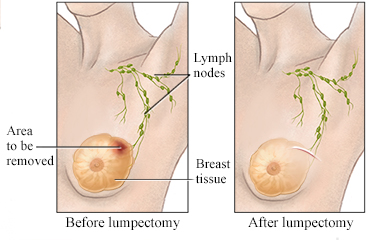Lumpectomy: What to Expect at Home
Your Recovery

Breast-conserving surgery (lumpectomy) removes the cancer and just
enough tissue to get all the cancer.
For 1 or 2 days after the surgery, you will probably feel tired and
have some pain. The skin around the cut (incision) may feel firm,
swollen, and tender, and be bruised. Tenderness should go away in
about 2 or 3 days, and the bruising within 2 weeks. Firmness and
swelling may last for 3 to 6 months.
You may feel a soft lump in your breast that gradually turns hard.
This is the incision healing. It is not cancer.
You may wear a well-fitted and supportive bra or binder, even during
the night, for 1 week. You will probably be able to go back to work
or your normal routine in 1 to 3 weeks after the surgery. This may
depend on whether you have more treatment.
Your doctor may have removed some lymph nodes in your armpit to see
if the cancer has spread. If so, you may feel either numbness or
tingling ("pins and needles") in your armpit or on the inside of
your upper arm. This should improve over the next several weeks.
Some people have numbness for a longer time.
This care sheet gives you a general idea about how long it will take
for you to recover. But each person recovers at a different pace.
Follow the steps below to get better as quickly as possible.
How can you care for yourself at home?

Activity
|
|
|
|
|
-
Avoid strenuous activities, such as biking, jogging,
weightlifting, or aerobic exercise, for 1 month or until
your doctor says it is okay. This may include housework,
such as washing windows, especially if you have to use the
arm next to the affected breast.
|
|
|
|
|
|
|
|
|
-
For 1 to 2 weeks, avoid lifting anything over 10 to 15
pounds or that would make you strain. This may include
heavy grocery bags and milk containers, a heavy briefcase
or backpack, cat litter or dog food bags, a vacuum
cleaner, or a child.
|
|
|
|
|
|
|
|
|
|

Diet
|
|
|
|
|
-
You may notice that your bowel movements are not regular
right after your surgery. This is common. Try to avoid
constipation and straining with bowel movements. You may
want to take a fiber supplement every day. If you have not
had a bowel movement after a couple of days, ask your
doctor about taking a mild laxative.
|

Medicines

Incision
care
Follow-up care is a key part of your treatment and safety. Be
sure to make and go to all appointments, and call your doctor if you
are having problems. It's also a good idea to know your test results
and keep a list of the medicines you take.
When should you call for help?
 Call 911 anytime you think you may need emergency care.
For example, call if:
Call 911 anytime you think you may need emergency care.
For example, call if:
Call your doctor now or seek immediate medical care if:
Watch closely for changes in your health, and be sure to contact
your doctor if:
Current as of: October 25, 2023
Content Version: 14.0
Care instructions adapted under license by your healthcare professional. If you have questions about a medical condition or this instruction, always ask your healthcare professional. Healthwise, Incorporated disclaims any warranty or liability for your use of this information.